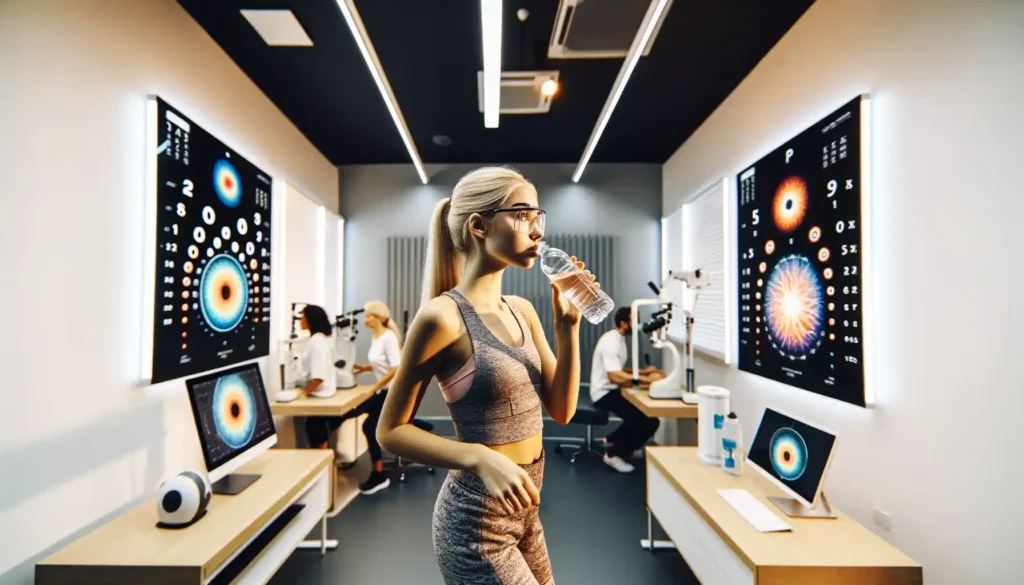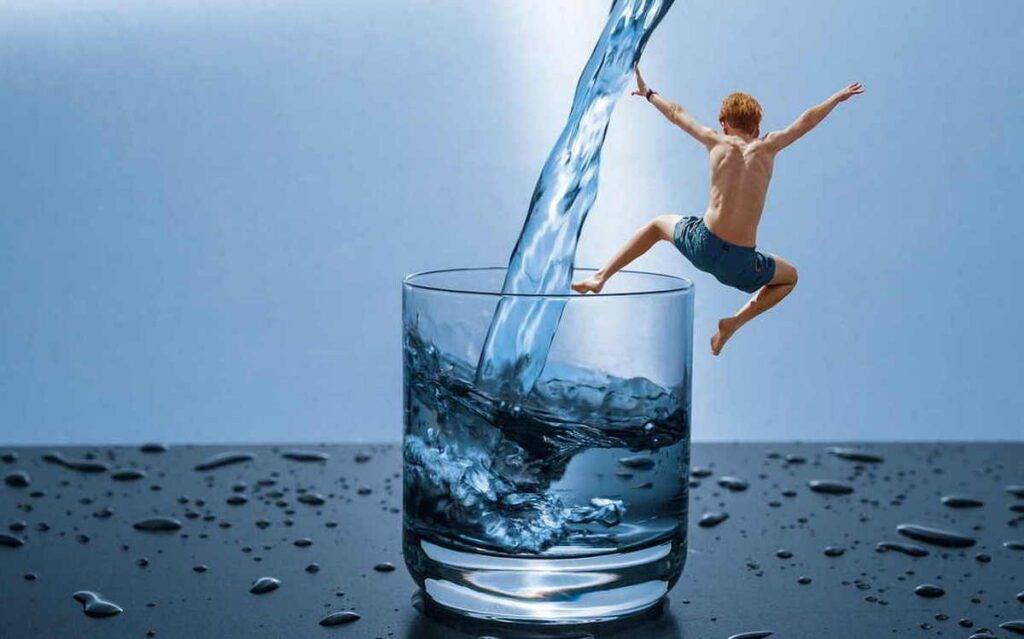How to Avoid Dehydration for Better Eye Health. Dehydration is one of the causes of poor brain function and memory. And all because the brain consists of 80% water. It turns out a little water-poor brain function – dehydration.

Dehydration is a condition that occurs when the body loses more fluids than it takes in. This can lead to a number of health problems, including poor eye health. In this article, we’ll explore the link between dehydration and eye health, and how lack of hydration can impact your vision.
Why Dehydration is Bad News for Your Brain and Eyesight
With a lack of water in the body, less tear fluid is produced, which moisturizes the eye’s surface. But tear fluid is a good antibacterial agent, which can destroy most bacteria and viruses. In this way, dry eyes are not only unpleasant but also dangerous, as the risk of infection increases and the development of various diseases. Nourishment of the eye in the area of the lens is carried out not with blood but with aqueous special concentrated nutrient solution. If a person drinks little water, it will be thick and will not circulate well. The most dangerous consequence is dehydration of the lens, its compaction, and the development of cataracts.
When the body is dehydrated, it doesn’t produce enough tears to keep the eyes lubricated. Tears are essential for eye health, as they help to wash away dirt and other irritants and keep the eyes moist. Without enough tears, the eyes can become dry, itchy, and irritated. This can lead to a condition called dry eye syndrome, which is a common problem among people who don’t drink enough water.

How to recognize dehydration
Does the body always signal to us that it lacks water? Unfortunately not. Intracellular dehydration develops over time, and the person at this time will not even feel a dry mouth. The feeling of thirst becomes less pronounced with age. Instead of drinking a glass of water, a person often starts to eat. If you follow yourself, you will notice that the desire for a “snack” is quite often actually the desire to drink. And enough to drink water or eat a juicy fruit so that “hunger” disappears.
Regularly receiving less water, the kidneys begin to work poorly. Part of their functions “Burdens” the liver, which exhausts over time. As a result, inhibited all metabolic processes, fats begin to break down poorly, and toxins are not at all removed from the organism. Extra pounds, frequent and severe headaches, dry skin with peeling and brittle, weak nails, dry eyes, and blurred vision – all that is often attributed to age and stress but the result of a constant lack of fluid in the body.
Dry eye syndrome can cause a range of symptoms, including:
- Stinging or burning in the eyes
- Redness and irritation
- Sensitivity to light
- Blurred vision
- Eye fatigue
- Difficulty reading or using a computer screen for long periods of time
In addition to causing dry eye syndrome, dehydration can also lead to other eye problems, such as:
- Corneal ulcers: Dehydration can cause the cornea (the clear outer layer of the eye) to become dry and damaged, which can lead to painful ulcers.
- Eye infections: Dehydration can make it easier for bacteria and viruses to enter the eyes, which can cause infections such as conjunctivitis (pink eye) or keratitis (infection of the cornea).
- Glaucoma: Dehydration can increase the pressure inside the eyes, which can damage the optic nerve and lead to glaucoma, a serious eye condition that can cause vision loss.
To prevent these problems, it’s important to stay hydrated by drinking plenty of water throughout the day. The amount of water you need depends on a variety of factors, such as your age, weight, activity level, and climate. As a general rule, most adults should aim to drink at least 8 cups (64 ounces) of water per day.
Pure water to Avoid Dehydration for Better Eye Health
It would seem that there is a lot of water around. She is in rivers, lakes, seas, and oceans. She is rain or snow, hanging in fog. But not all water is suitable for use and keeps you healthy. Only clean water is good for the body. What is “pure water”? The content of dissolved chemicals (hardness salts, iron, heavy metals, radionuclides, and many others) in clean water must comply with international standards. Clean water should not contain undesirable tastes, odours, chlorine compounds.
Clean water should not be contaminated with bacteria. Now there are drinking water supply standards in which all the bacteriological, organoleptic and toxic chemical indicators complied. They are not once and for all established and changed from time to time. Sometimes people think that the purest water is distilled water. This is true. But in that case, the concepts of “clean” and “drinking” are not equal to each other.
Distilled water to Avoid Dehydration for Better Eye Health
Distilled water isn’t good at all for drinking. It can only be consumed if there is no other choice. Distilled water is obtained by distillation. That is, it may contain volatile organic impurities that were contained in the water before distillation. There are no minerals, and this is harmful to the body. And precisely because of the lack of any mineral substances, it seems tasteless. The benefits of mineral water are defined in layers of the lands through which she passed, having absorbed various minerals.
Tap water to Avoid Dehydration for Better Eye Health
Most often, the biggest criticism is caused by tap water. She can be turbid after passing through old pipes or due to problems with water intake. For disinfection, it is chlorinated, and it acquires a characteristic taste and smell. These traces of heavy metals such as lead, copper, and zinc are often found in water. The older the pipes, the more rust accumulates in them. According to regulations, chlorine concentrations in tap water are not hazardous for human health. However, for people with allergic diseases, the presence of chlorine, even in such low concentrations, greatly impairs well-being. In addition, chlorine interacts with organic compounds found in tap water, with the formation of quite harmful organochlorine compounds.
Typically, tap water is boiled, destroying bacteria in the water and reducing the content of highly volatile components. However, due to the boiling off of water, an increase in the concentration of non-volatile impurities in it (for example, salts of heavy metals). BUT useful substances, such as calcium and magnesium salts, settle on the walls of the kettle in the form of a solid white bloom.
Water purification process
It has now become clear that water purification is necessary. By some signs, you can determine what kind of disadvantages water has:
– green and brown smudges on dishes – sulfuric and hydrochloric acids are present in the water;
– fishy, musty, or woody odour – organochlorine compounds are present;
– the formation of dark spots on dishes and silver items, the presence of yellowish, black stains on the surface of the sink – there is dissolved hydrogen sulphide;
– the smell of phenol – industrial wastewater got into the water;
– salty taste – high content of magnesium and sodium salts;
– formation of stains on aluminium dishes – high alkali content;
– metallic taste – high iron content;
– darkening and corrosion of the stainless steel sink – high chloride content;
– reddish-brown sediment – there is oxidized iron in the water, washed out from rusty pipes;
– turbid water- either high air content due to a faulty pump or the presence of methane.
Recommended water intake to Avoid Dehydration for Better Eye Health
Speaking about a person, usually, first of all, people remember the skeleton and muscles, then various organs and the main part of the human body is water. A human body with a body weight of 68 kg or 150 pounds contains about 41 litres or 11 gallons of water. The brain consists of 80% water; in the muscles, it is 76%; in bones – about 25%, blood, is 92% water. The younger the person, the more water he is contained. A newborn child has 70% of it. With age, the amount of water gradually decreases. And this directly affects the deterioration of the work of all internal organs.
All vital processes in the human body take place in the aquatic environment. It regulates body temperature; humidifies the air entering the body; delivers nutrients and oxygen to all cells of the body; promotes the absorption of nutrients and substances by organs; removes waste from life processes. A person can live without water for only a few days. Water loss of less than 2% of body weight leads to a feeling of thirst, with a loss of 6-8%, fainting occurs condition, at 10% – hallucinations, 10-20% – critical and very life-threatening. Water in the body can be free, which forms the basis of extracellular and intracellular fluid.
How much water does a person lose in 24 hours
The amount of incoming and outgoing water is regulated as follows in a way that one fits the other. With urine, sweat, and exhaled air, a person loses 2.0–2.5 liters of water every day. With increased physical activity or high ambient temperatures, lost liquids can reach 6-10 liters per day. About 50% of the daily volume is excreted through the kidneys. water, with sweat through the skin – 32%, with exhaled air through the lungs – 13%, through the intestines – five %. The person compensates for the lost water by consuming it. In a healthy adult, the amount of water required can be calculated: it is approximately 40 ml per 1 kg of weight.

Eyesight Academy Course to get better eyesight and improve eye health
Are you tired of relying on glasses or contacts to see clearly? Do you want to improve your vision naturally and regain your visual independence? Look no further than the Eyesight Academy, the premier online course for natural vision improvement!
Our comprehensive course is designed to help you improve your vision naturally, using a combination of eye exercises, lifestyle changes, and nutritional advice. Whether you suffer from nearsightedness, farsightedness, astigmatism, or other common vision problems, our course can help you see better and reduce your dependence on corrective lenses.
Here’s what you can expect from our eyesight improvement course:
- A personalized vision assessment to determine your specific visual needs and goals
- A series of eye exercises and techniques to improve your visual acuity, focusing ability, and eye muscle strength
- Lifestyle changes to reduce eye strain and improve overall eye health, such as proper lighting, posture, and screen time management
- Nutritional advice and supplements to support healthy eye function and prevent age-related vision problems
- Ongoing support and guidance from our experienced vision coaches, who are dedicated to helping you achieve your vision goals
Our course is backed by years of scientific research and proven results, and has helped countless people improve their vision naturally and regain their visual independence. Don’t wait any longer to start seeing clearly again – enroll in the Eyesight Academy today and take the first step towards better vision and a brighter future!
How much water is needed to Avoid Dehydration for Better Eye Health
The total daily need for water in an adult is determined by the nature of the performed work, environmental conditions, and the quality of food eaten. With food, a person receives 600-800 ml of water daily. For example, boiled meat contains 40% water, fish – almost 70%, and scrambled eggs – also about 70%. Porridge contains up to 80% water, bread – about 50%, in vegetables and fruits – up to 90% of water. In general, 50-60% of “dry” food consists of water.
With a conditional weight of 70 kg or 155 pounds, a person should receive 2.8 litres of water per day.
It is better if the consumption of this amount of water is distributed evenly throughout the day. Usually, in the morning, it is 200-250 ml of water. Before lunch – 200-250 ml with the first course and 200-250 ml with the third. At dinner, 250 ml of water, and 2 hours before bedtime 200 ml of water. In total, it turns out about as much as necessary to maintain water balance. Sometimes people drink more of these numbers, sometimes less. The individual role also plays a role here. The need and characteristics of nutrition. Someone drinks a little but actively eats apples or other fruit, or maybe he loves a vegetable stew or a cucumber salad, and this gets the necessary amount of liquid.
Too much water intake
Excessive water intake for a healthy person does not have negative effects. But with diseases of the heart and kidneys, this may be undesirable. These organs begin to work with an additional load, the pressure rises. With sweat and urine, some amount of mineral salts and vitamins are lost, which weakens the body. If there is a significant lack of water in the body (that is, dehydration), the loss of water exceeds the intake and formation of it in the body, and the thickening of the blood develops. At the same time, the work of the brain worsens, oxygen supply to tissues, and conditions are created for the formation of blood clots in the blood vessels.
The signal about the lack of water in the body through nerve receptors enters the head and the brain, and the result is a feeling of thirst. It is expressed by a feeling of dryness in the mouth. In addition, salts of various substances affect the water content in the body and its metabolism. For example, sodium salts retain water in the body, while calcium and potassium salts increase urination and promote water excretion. That is why drinking milk or a large amount of vegetables or fruits noticeably increases the volume of urine excreted.
Pure water for better eye health
Pure water, without unnecessary impurities and technical or chemical processing, allows the creation of the best environment for the course of biochemical processes in the body. For a city person, in addition to the usually required amount of water (30-40 ml per 1 kg of body weight body), an additional dose is needed – about 1-2 liters in excess of the norm (depending on body weight and physical and psychological stress). It is recommended to drink more liquid in case of infectious diseases, poisoning, high body temperature, liver diseases, and generally for good health.

